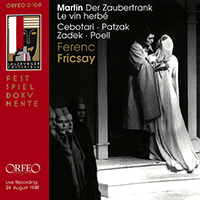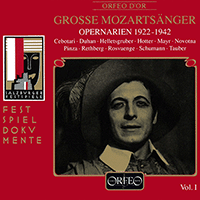Maria Cebotari
The daughter of a teacher, Maria Cebotari showed early musical talent, singing in a church choir and studying at the Chişinău Conservatory. Able to speak both Romanian and Russian, she joined a troupe of Russian émigré actors from the Moscow Art Theatre Company. They were visiting Chişinău to perform and needed a young actress who could also sing in Russian. Cebotari married the manager, Count Alexander Virubov, and together they travelled across Europe to Paris, where Maria sought work as a singer in 1929. Shortly afterwards they moved on to Berlin where they met Max von Schillings, who recommended that Maria study singing with Oscar Daniel, a professor at the Berlin Music High School.
After a short period of intensive study, Fritz Busch offered Cebotari a three-year contract with the Dresden State Opera, where she made her début as Mimì/La Bohème in April 1931. Shortly afterwards Bruno Walter cast her as Amor/Orfeo ed Eurydice at the Salzburg Festival. Cebotari was extremely successful in Dresden, being appointed a Kammersängerin in 1934. Her versatility was well demonstrated by the large number of rôles she created there, in operas such as Mister Wu (d’Albert, 1932), Münchhausen (Lothar, 1933), Der verlorene Sohn (Heger, 1936), Romeo und Julia (Sutermeister, 1940) and above all the central part of Aminta in Richard Strauss’s Die schweigsame Frau in 1935. She first appeared at Covent Garden with the Dresden company in 1936 as Susanna/Le nozze di Figaro, Zerlina/Don Giovanni and Sophie/Der Rosenkavalier.
Strauss, who admired Cebotari greatly, describing her as ‘the best all-rounder on the European stage…she is never late and she never cancels’, recommended that she move to Berlin. In 1936 therefore she joined the Berlin State Opera as a prima donna, remaining active there until 1943. Among her principal rôles were the Countess/Le nozze di Figaro, all three female rôles in Don Giovanni, both Micaëla/Carmen and Carmen, Mimì and the title part in Turandot, as well as many leading rôles in operetta. She was especially admired for her interpretation of Madama Butterfly (Herbert von Karajan in a BBC interview given long after her death, said she was the greatest Butterfly that he had ever conducted), Salome (1942), Maddalena/Andrea Chénier (1942) and her creation of the title rôle in Richard Strauss’s Daphne (1939). Other important Berlin assignments included the title rôle in Rezniček’s Donna Diana (1940), the German première of Zandonai’s La farsa amorosa (1941) and the first performance of Othmar Schoek’s Das Schloss Dürande (1943). Repertoire rôles included Olympia, Antonia and Giulietta/Les Contes d’Hoffmann, Konstanze/Die Entführung aus dem Serail, Tatyana/Eugene Onegin, Violetta/La traviata, Eurydice/Orfeo ed Eurydice and the title part in Arabella.
In 1938 Cebotari had separated from her husband and married the actor Gustav Diessl. Their home in Berlin was destroyed by enemy action in 1943 and so she welcomed the invitation to join the Vienna State Opera in the same year, remaining there for the rest of her life. Rôles that she created during this period included Lucille/Dantons Tod (Gottfried von Einem, Salzburg Festival 1947) and Iseut/Le Vin herbé (Frank Martin, Salzburg Festival 1948). Cebotari was a leading member of the Vienna State Opera on its historic visit to Covent Garden in 1947, when she sang Salome, the Countess and Donna Anna. During and after World War II she appeared as a guest in many international opera houses, including Amsterdam, Basle, Berne, Florence, Milan, Munich, Rome, Prague, Stockholm, Venice and Zürich.
Early in 1948 Cebotari’s husband died. She herself, who had earlier told friends that life without him was something she could not contemplate, had in fact only a short time to live. During a performance of Le nozze di Figaro at La Scala in early 1949 she suffered severe pain; and shortly afterwards, at the end of March 1949, collapsed during a performance of Millöcker’s Der Bettelstudent in Vienna. Surgery revealed cancer in her liver and pancreas, from which she died two months later. Her two sons by Diessl were adopted by the British concert pianist Clifford Curzon.
Cebotari had an extremely versatile voice, her repertoire covering coloratura, soubrette, lyric and dramatic rôles, with a concentration upon the operas of Mozart, Verdi, Puccini and Richard Strauss. Her discography is extensive and includes many radio recordings made during the Third Reich, as well as numerous individual arias recorded before and after World War II. In addition to her operatic career she appeared in several feature films, including Mutterlied (1937) and Amami, Alfredo! (1940), both with Beniamino Gigli, première der Butterfly (1939), Drei Frauen um Verdi (1938) and the anti-Soviet Odessa in fiamme (1942).
© Naxos Rights International Ltd. — David Patmore (A–Z of Singers, Naxos 8.558097-100).


















